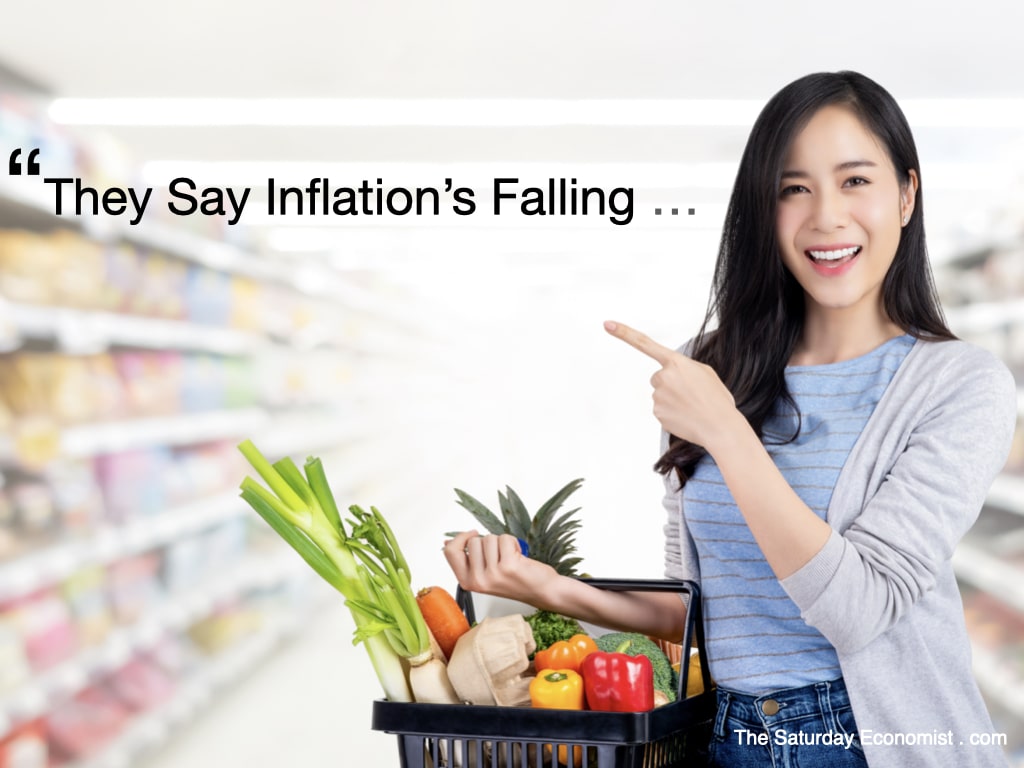|
They say inflation's falling ... so far not fast enough. Headline inflation CPI basis eased to 3.2% in March from 3.4% prior month. Markets were disappointed. City analysts had expected a bigger drop. A fall to 3.1% had been expected. There's just no pleasing some folk.
Best not to look at the detail. Goods inflation fell to 0.8%. Service sector inflation eased to 6.0%. Add the two together and divide by two, headline inflation would have been recorded at 3.4%. Weight them effectively (Goods inflation 0.5099 and Service sector inflation 0.4900), the headline rate would have been 3.4%, down from 3.6% prior month. Disappointed by the drop to just 3.2%. Markets would freak at a real rate of 3.4%. As it was the Governor sought to allay concerns suggesting the numbers were in line with expectations. The Chancellor Jeremy Hunt suggested this was confirmation of a soft landing. "The economy has turned the corner. People are beginning to see that." "The plan is working. Inflation is falling faster than expected. It is down to the lowest level in nearly two and a half years." he said. The slower decline in inflation, reinforced speculation the Bank of England will leave rates higher for longer. Financial markets are beginning to think the first rate cut may not happen until November. That's a tough call. Ten year bond yields trade at 4.25 this morning up from 4.10 at close last week. Analysts think inflation will slip back to the official 2 per cent target in April, impacted by a reduction in the energy price cap. Ruth Gregory, deputy chief UK economist at Capital Economics said: "With utility prices set to fall by over 12. per cent in April, inflation will still just about fall below the 2 per cent target in the month." "As long as inflation continues to fall fast in the coming months as we expect, the Bank may still feel comfortable cutting interest rates in June." For the moment this remains our central outlook, with further cuts possible by end of the year, closing the year towards 4.5%. Comments from Andrew Bailey suggest the MPC is prepared to loosen monetary policy ahead of the Fed. "There is strong evidence, inflation is receding. The dynamics for inflation are different now between the UK and the USA." Hawks in the Bank will remain concerned about the high levels of service sector inflation and the latest earnings data. Average weekly earnings at 5.6% are incompatible with a 2% inflation target. Doves on the MPC will express concern about negative growth in the economy, sluggish retail sales, the slight rise in unemployment and the drop in vacancies. Food inflation eased to 3.9% in March and core inflation eased to 3.9% from 5.0%. As we said earlier this week, the bears are watching. Come the MPC meeting in June, the doves will hold sway. For scenario planners we caution, 4.5% base rates may well be the new benchmark. No return to Planet ZIRP. In the UK, prior to the Great Financial Crash [2000 - 2008] the average inflation rate was 2.0%, the average UK bank rate was 4.50%. Ten year gilt yields averaged 4.50%. Thirty year gilts averaged 4.60%. The average growth rate was 2.5%. The average unemployment rate was 5.0%. Earnings averaged 3.9%. This is our "return to the mean" outlook.
0 Comments
Leave a Reply. |
The Saturday EconomistAuthorJohn Ashcroft publishes the Saturday Economist. Join the mailing list for updates on the UK and World Economy. Archives
July 2024
Categories
All
|
| The Saturday Economist |
The material is based upon information which we consider to be reliable but we do not represent that it is accurate or complete and it should not be relied upon as such. We accept no liability for errors, or omissions of opinion or fact. In particular, no reliance should be placed on the comments on trends in financial markets. The presentation should not be construed as the giving of investment advice.
|
The Saturday Economist, weekly updates on the UK economy.
Sign Up Now! Stay Up To Date! | Privacy Policy | Terms and Conditions | |

 RSS Feed
RSS Feed